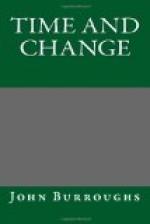An agent of evolution is the influence of the environment, but who sees the environment set its stamp upon animal life? After many generations we may see the accumulated results. In a few instances the results are rapid. Thus sheep lose their wool in tropical climates and a northern fur-bearing animal its fur. The well-being of the animal demands this change, and demands it quickly. Fish lose their sense of sight in underground streams; this loss is not so vital and it comes about much more slowly. A tropical climate sets its stamp upon the complexion and character of man, but this again is a slow process, as the same stress of necessity does not exist.
In the tendency to variation—in form, size, disposition, power, fertility—man differs from all other animals. In the same race, in the same family, we find infinitely varied types. Among the wild creatures all the individuals of a species are practically alike. We can hardly tell one fox, or one marmot, or one chipmunk, or one crow, or one hawk, or one black duck from another of the same species. Of course there are slight individual differences, but they are hardly distinguishable. Among the insects, one bee, one beetle, one ant, one butterfly seems the exact copy of every other individual of its kind. The law of variation seems practically annulled in the insect world.
It is the wide and free range of this law in the human species that has undoubtedly led to the great progress of the race. There has been no dead level—no democracy of talent—no equality of gifts, but only equality of opportunity. Men differ from one another in their mental endowments, capacities, and dispositions vastly more than do any other creatures upon the earth. This difference makes man’s chances of progress so much the greater; he has so many more stakes in the game. If one type of talent fails, another type may win; if the lymphatic temperament is not a success, try the sanguine or the bilious; blue eyes and black eyes and brown eyes will win more triumphs than blue or black or brown alone. Arms or legs extra long, sight or hearing extra sharp, wit extra keen, judgment extra sure—all these things open doors to more progress. Variation gives natural selection a chance to take hold, and where the struggle for life is the most severe the changes will be the most rapid and the most radical. Without the pressure of the environment natural selection would not select. The tendency to physical variation in man is probably no greater than in other creatures, but his tendency to mental variation is enormous. He varies daily from mediocrity to genius, hence the enormous range of his chances of progress. From the first variation that started him on his way in his line of descent, variation must have been more and more active till he varied in the direction of reason, long before the dawn of history, since which time his progress has been by rapid strides—and more and more rapid till we see his leaps forward




